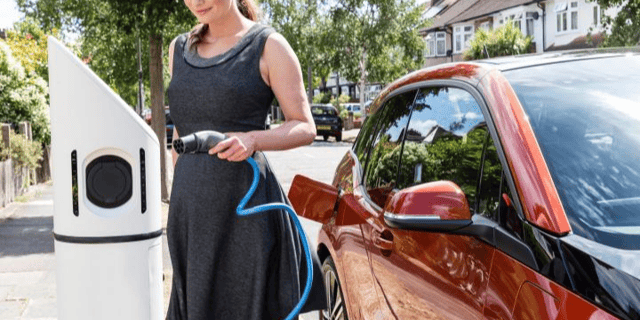 Updated October 8th. More electric vehicle (EV) charging infrastructure is on the horizon in Massachusetts. The investor-owned utility companies (Eversource, National Grid, and Unitil) recently submitted proposals to expand their EV programs through 2025.
Updated October 8th. More electric vehicle (EV) charging infrastructure is on the horizon in Massachusetts. The investor-owned utility companies (Eversource, National Grid, and Unitil) recently submitted proposals to expand their EV programs through 2025.
In the coming months, the Massachusetts Department of Public Utilities (DPU), the public agency responsible for utility oversight, will review the ideas and decide whether the proposals will be executed as is or with modifications.
We at Green Energy Consumers Alliance will be “intervenors” in the DPU’s decision-making process to give our opinions on what is good in the plan and what can be improved based on our experience running consumer-focused EV programs. Our goal is to make sure that the utilities’ proposals adequately support Massachusetts’ plan to get 750,000 to 1 million EVs on the road by 2030.
The public had an opportunity to weigh in on September 14. But whether you went to the hearing or not, you can take our 10-minute energy use survey if you're a MA resident to help us make a strong case for the best charging infrastructure.

What is in the docket?
In past filings, the DPU has approved Eversource and National Grid EV Make-Ready Programs for $40 million and $25 million respectively to support charging station infrastructure for the public, multi-unit dwelling, and workplace sectors. With the Make Ready program, the utilities pay for the costs associated with their equipment and wires running from their distribution system to the customer’s site. The customer is responsible for paying the remainder of the cost to install the actual charging equipment. These investments have supported hundreds of charging port installations in Eversource and National Grid territories.
The new proposal now under discussion expands funding to continue Make Ready programs and fills the gaps to provide support for more charging. For example, the new proposals offer:
-
- Incentives to purchase electric vehicle charging stations for private use. Customers will receive $300 to buy a charging unit if they agree to participate in an off-peak charging program or managed charging program.
- Incentives for single-family homes to install a charging unit: $700 per port, $1700 if you live in an Environmental Justice community. Incentives scale up for pricier installations in 2-4 unit and 5+ unit residential buildings.
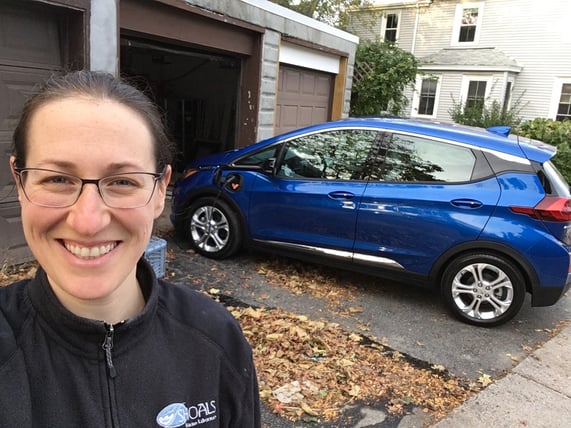 EV charging should be easy to access and affordable to install for all drivers, whether they park in a garage or in a shared lot.
EV charging should be easy to access and affordable to install for all drivers, whether they park in a garage or in a shared lot.
Within each category, the utilities provide greater financial incentives for environmental justice communities, where the cost barriers may be particularly burdensome. For example, in residential buildings with 5+ units, the utility proposes to pay 50% of the average cost of hardware, whereas residential buildings with 5+ units in environmental justice communities will be eligible to be reimbursed for 100% of the average cost of hardware.
We’re glad to see that the utilities have learned more from their experience installing charging stations and are proposing new ideas to advance EV adoption:

-
- National Grid wants to install 200 pole-mounted chargers in 10 municipalities (based on the success of their pilot in Melrose, pictured here).
- National Grid wants to co-locate energy storage with DC fast charging stations at sites where the cost to upgrade the distribution infrastructure is high.
- National Grid wants to offer 300 rebates to help schools in their service territory purchase electric school buses.
-
- National Grid and Eversource want to invest in workforce development and electrician training initiatives.
- National Grid and Eversource are proposing to change how operators of DC fast charging stations pay for electricity to make DC fast charging financially viable in the short-term and financially sustainable in the long-term.
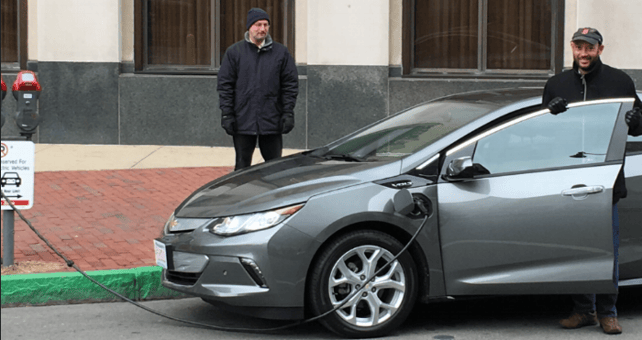 Public and workplace charging is especially important to support drivers on long road trips or those who can't charge their vehicle at home.
Public and workplace charging is especially important to support drivers on long road trips or those who can't charge their vehicle at home.
There’s a lot more detail in the proposals. If you want to dive into the nitty-gritty, you can read our summary notes here or review National Grid and Eversource proposals directly.
Wait a minute – why should the utility company be supporting electric vehicles?
The DPU exists to make sure that utility companies make investments that align with the interests of ratepayers. As a consumer advocacy organization, we think it’s important to consider the benefits of mitigating climate change when making decisions for ratepayers.
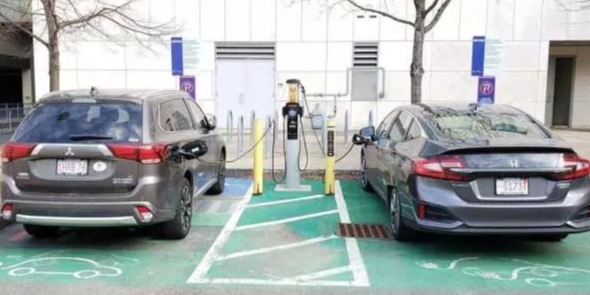 There's no way to meet our climate goals without a rapid adoption of electric vehicles. The utility companies are well-positioned to help make this happen.
There's no way to meet our climate goals without a rapid adoption of electric vehicles. The utility companies are well-positioned to help make this happen.
Addressing the climate crisis requires rapidly shrinking our dependence on fossil fuels, including as the fuel source for transportation. That means electric utility companies have substantial roles to play to make sure our electrical system is ready and to help address barriers within the existing system to support the adoption of these new technologies. Utility support makes the goal of one million EVs by 2030 much more achievable.
Investing in electric vehicles in a smart way will allow us to get the most benefits in the transition to a cleaner, smarter electric system. In the past, we’ve written about how paying EV drivers to charge at night saves everyone (including non-EV drivers!) money. When we turn the spigot down on imported gasoline and diesel fuel, we benefit economically and environmentally; the DPU should consider all of this in their decision-making.
What can you do?
This docket is an opportunity to make charging more accessible for Massachusetts. If you live in MA, you can help us make our case by taking our 10-minute energy survey about your own energy use.
Here are the key points we are emphasizing at the DPU. If you have personal experience related to any of the below topics, your expertise is welcome.
-
- Lack of charging infrastructure is a barrier to EV adoption for Massachusetts. We need more charging stations, and this plan gets us moving in the right direction.
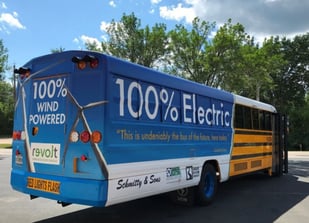 Electric school buses are good for the climate, the respiratory health of children, and the operational budgets of school districts. Upfront cost, however, is still a barrier. We support efforts to make electric school buses more accessible by providing rebates for their purchase, as National Grid proposes to do.
Electric school buses are good for the climate, the respiratory health of children, and the operational budgets of school districts. Upfront cost, however, is still a barrier. We support efforts to make electric school buses more accessible by providing rebates for their purchase, as National Grid proposes to do.- EV drivers are willing to charge off-peak if it will mean lower costs. EV drivers should receive incentives for off-peak charging because they deliver benefits to the system and because it makes it more affordable to drive on electricity. Eversource should submit a plan for off-peak charging incentives like National Grid has.
There’s another docket being considered about modernizing the electric grid. You can learn about it here.
 Updated October 8th. More electric vehicle (EV) charging infrastructure is on the horizon in Massachusetts. The investor-owned utility companies (Eversource, National Grid, and Unitil) recently submitted proposals to expand their EV programs through 2025.
Updated October 8th. More electric vehicle (EV) charging infrastructure is on the horizon in Massachusetts. The investor-owned utility companies (Eversource, National Grid, and Unitil) recently submitted proposals to expand their EV programs through 2025.
 EV charging should be easy to access and affordable to install for all drivers, whether they park in a garage or in a shared lot.
EV charging should be easy to access and affordable to install for all drivers, whether they park in a garage or in a shared lot.
 Public and workplace charging is especially important to support drivers on long road trips or those who can't charge their vehicle at home.
Public and workplace charging is especially important to support drivers on long road trips or those who can't charge their vehicle at home.  There's no way to meet our climate goals without a rapid adoption of electric vehicles. The utility companies are well-positioned to help make this happen.
There's no way to meet our climate goals without a rapid adoption of electric vehicles. The utility companies are well-positioned to help make this happen. Electric school buses are good for the climate, the respiratory health of children, and the operational budgets of school districts. Upfront cost, however, is still a barrier. We support efforts to make electric school buses more accessible by providing rebates for their purchase, as National Grid proposes to do.
Electric school buses are good for the climate, the respiratory health of children, and the operational budgets of school districts. Upfront cost, however, is still a barrier. We support efforts to make electric school buses more accessible by providing rebates for their purchase, as National Grid proposes to do.
Comments